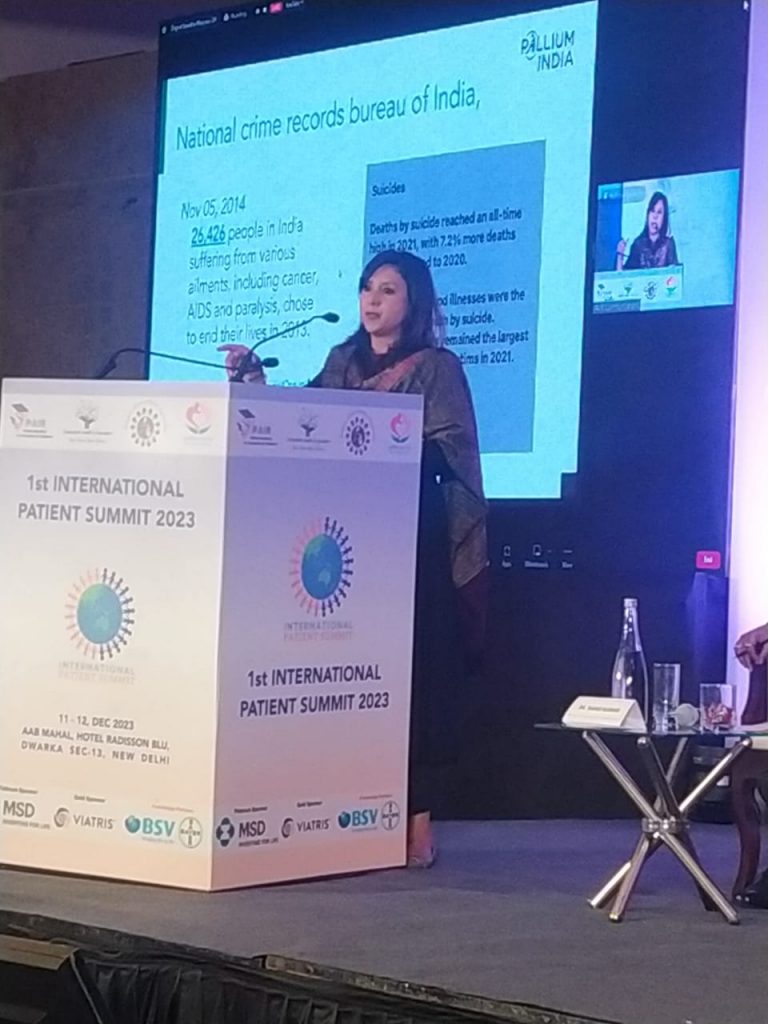Unveiling Voices at the 1st International Patient Summit: Pallium India Contributes to a Collaborative Future

The 1st International Patient Summit, held on December 11-12, 2023, in New Delhi, India, marked a significant step towards empowering patients and fostering a more inclusive healthcare landscape. This event brought together diverse stakeholders, including patients, patient groups, healthcare professionals, and policymakers, to address critical challenges and chart a path for patient-centered healthcare in the Asia Pacific region.
Pallium India, a leading organization dedicated to improving the lives of people living with chronic and life-limiting illnesses, actively participated in the summit. Smriti Rana, Head of Strategic Programs and Partnerships at Pallium India, represented the organization as a panelist, adding her valuable perspectives to the discussions.
The agenda for the two-day summit encompassed a wide range of topics, encompassing:
- NCDs and Gender: Focusing on the intersectional challenges faced by women with NCDs, particularly Endometriosis and Polycystic Ovary Syndrome (PCOS).
- Building Patient Networks: Exploring ways to establish regional and national patient networks to amplify patient voices and advocate for improved healthcare access and quality.
- Patient Safety and Quality of Care: Examining the importance of patient involvement in identifying and reporting safety concerns, ensuring access to safe and effective medications, and promoting patient-centered communication.
- Data, Registries, and Technology: Discussing the effective use of data and technology to improve patient care and research, while ensuring ethical considerations and privacy concerns are addressed.
- Communicable Diseases: Assessing the lessons learned from managing TB, HIV, and Hepatitis C, and exploring strategies for preparedness and response to future pandemics.
- Access to Advanced Therapies: Engaging in dialogues on facilitating access to innovative treatments, including gene therapy and genomics, within the Asia Pacific region.
- Mental Health Integration: Advocating for the integration of mental health services into all healthcare programs, recognizing the importance of addressing mental health needs alongside physical health.
Smriti Rana’s participation contributed to the summit by:
- Enhancing the discussion on mental health and end-of-life care: She shared insights on the crucial role of palliative care in alleviating suffering and promoting holistic well-being for individuals approaching the end of life. This perspective enriched the dialogue around the integration of mental health services into broader healthcare programs.
- Highlighting Pallium India’s work with the community: Through her participation, Pallium India had an opportunity to showcase its dedication to promoting community engagement in palliative care. This included initiatives that empower individuals and communities to actively participate in shaping healthcare policies and programs that impact their lives.
- Amplifying the voices of those affected: As a representative of Pallium India, Smriti Rana helped amplify the voices of individuals living with chronic and life-limiting illnesses. This ensured that their needs and perspectives were represented in the discussions, contributing to the development of more inclusive and patient-centered healthcare strategies.
Pallium India’s presence at the summit exemplified the organization’s commitment to fostering collaboration and advocating for a future where patients are empowered to take ownership of their health and well-being. By participating in dialogue with diverse stakeholders, Pallium India continues to contribute to shaping a more equitable and patient-centered healthcare landscape.
Additionally, the summit included the participation of Dr. Preeti Chauhan, Head of National Policy at Pallium India. Their presence further amplified the collective voice of Pallium India and the individuals and communities it serves.
A significant highlight of the summit was the public presentation of a “Patient Charter for Hypertension Control” by the PAIR Academy. This document outlines a series of recommendations from the community to improve the quality of care for individuals living with hypertension. The charter emphasizes the need for:
- Updating existing patient rights charters to address the specific needs of individuals with chronic conditions.
- Making blood pressure monitoring readily available at the community level through trained personnel and properly calibrated equipment.
- Empowering individuals to self-monitor their blood pressure by providing training and affordable, calibrated equipment, and utilizing telemedicine for support.
- Strengthening patient adherence to medication through empathetic counseling and support from healthcare professionals.
- Ensuring the well-being of pregnant women with pre-eclampsia through dedicated monitoring and interventions.
- Facilitating access to medications and diagnostic services for elderly, disabled, and remote individuals.
- Promoting public awareness and behavioral changes through educational materials and campaigns focused on healthy lifestyles, tobacco cessation, and alcohol moderation.
- Establishing transportation and emergency response systems to ensure timely access to care in rural areas and Enhancing continuity of care.
Overall, it was an insightful and first of its kind summit which would hopefully continue annually for a long time to come so the silent voices can be finally heard.
(Report prepared by Dr. Preeti Chauhan, Head – National Policy, Pallium India.)






